Twitter Suspends Khamenei Account For Video Threatening Trump
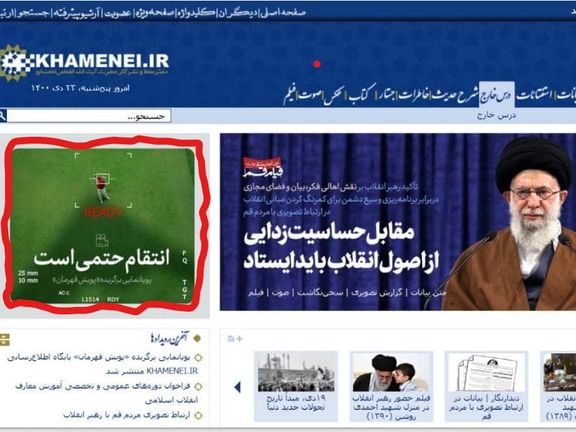
Twitter has permanently suspended one of Iranian leader Ali Khamenei’s accounts apparently for sharing an animation video depicting the killing of Donald Trump.

Twitter has permanently suspended one of Iranian leader Ali Khamenei’s accounts apparently for sharing an animation video depicting the killing of Donald Trump.
KhameneiSite, which was suspended is just one of the accounts controlled by Khamenei’s office. Iranian Twitter users have been urging the social media giant to suspend all his accounts for its violent and vitriolic content. Many say that if Donald Trump’s account can be suspended, Khamenei’s accounts should also be closed.
On January 13, Khamenei’s official website posted an animation video showing an all-terrain vehicle with an operator on board driving through a golf course and approaching a point from where its camera shows a man who looks like Trump playing golf. The operator targets the figure and a large gun on top of the vehicle aims at the target and the video ends.
The same video was reportedly shared on Twitter, with threats to avenge the killing of Qasem Soleimani, and then deleted, which could be the reason why @KhameneiSite was suspended.
Khamenei and other top Iranian officials have been threatening revenge against former US officials whom they blame for killing its chief military and intelligence operator in the Middle East in January 2020.
Last January, Twitter suspended another one of Khamenei’s accounts after it also published a threat against Trump.
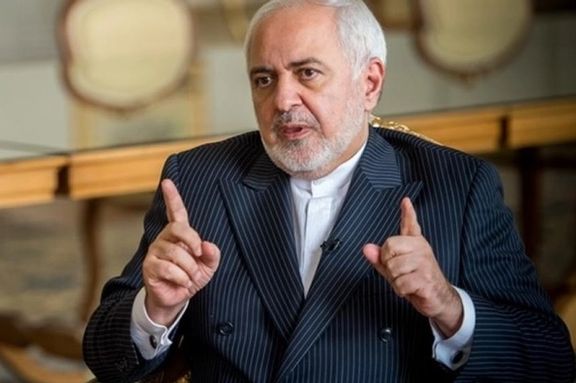
Mohammad Javad Zarif was not invited to a policy meeting with President Ebrahim Raisi because he criticized Russia last year, a Tehran newspaper said Saturday.
Sharq daily said that Riaisi invited a meeting of former foreign ministers and top officials this week to discuss his upcoming trip to Moscow, but Zarif was not invited. The newspaper added that not inviting him could be related to his criticism of Russia in an audio file released by Iran International last April.
In the confidential recording, Zarif had criticized both former Qods Force commander Qasem Soleimani and Russia for harming the prospects of JCPOA, Iran’s 2015 nuclear agreement with world powers. Zarif argued that Russia tried to harm the JCPOA, and at one point he to use “rude and non-diplomatic language” with Russian foreign minister Sergei Lavrov.
Iran’s hardliners always attacked Zarif accusing him of being more concerned with having good relations with the West and engineering the nuclear agreement, which former US president Donald Trump abandoned in 2018.
Raisi is scheduled to visit Moscow on January 19 and reports speak of his plans to purchase Russian arms and sign a 20-year cooperation agreement.
Pundits and citizens in Iran have been increasingly criticizing Russia recently, accusing it of trying to use Iran and its nuclear dispute for its own interests.
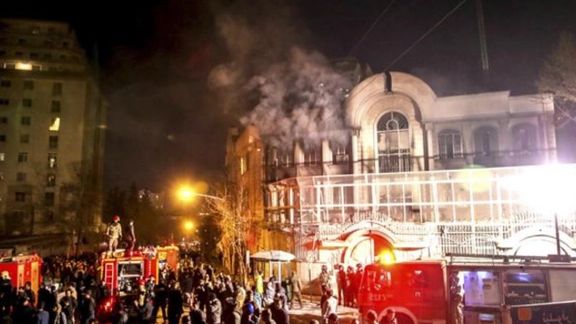
An Iranian lawmaker says Tehran and Riyadh are getting ready to reopen their embassies, closed since Saudi diplomatic missions were attacked by mobs in 2016.
Jalil Rahimi Jahanabadi, a member of the National Security and Foreign Policy committee of the parliament, said in a tweet on Saturdaythat Iran and Saudi Arabia are preparing to restore diplomatic relations, which were cut following the incident.
Mobs led by hardliners attacked the Saudi embassy in Tehranand its consulate in Mashhad, invading the missions, vandalizing, and burning the properties, on January 2, 2016.
Jahanabadi said relations between Iran and Saudi Arabia will have an important impact on easing regional tensions and boosting the unity of the Islamic world.
He called on Iran’s security and media institutions to be careful about activities by the “vicious Israelis and stupid radicals” that may try to disrupt ties between Tehran and Riyadh.
Recently, Iranian officials have been insisting that a new round of Iran-Saudi negotiations will take place, but Riyadh has so far been silent.
One of the most contentious issues between Iran and Saudi Arabia is Tehran’s support for Hezbollah in Lebanon.
Riyadh and Tehran held talks last year to reduce tensions with the aim of restoring diplomatic ties but Saudis have said the talks were exploratory with no tangible results.
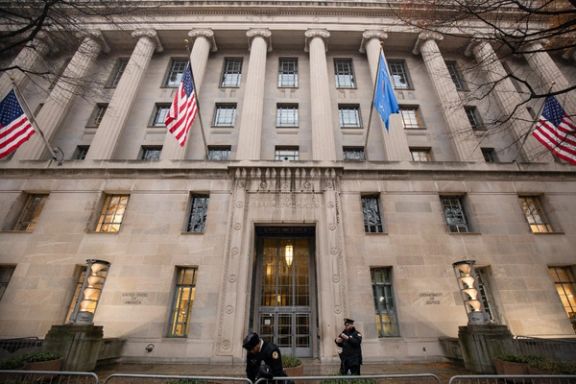
The United States has arrested an Iranian dual citizen for conspiring to illegally export electronic goods and technology to the Islamic Republic.
The eastern district of New York said in a statement on Friday that a criminal complaint has been unsealed in federal court in Brooklyn charging Kambiz Attar Kashani with conspiring to provide products such as subscriptions to proprietary software, fixed attenuators, power supplies and storage systems to the government of Iran.
Kashani was arrested on Thursday in Chicago, Illinois, and will remain in custody pending a detention hearing.
From around February 2019 through June 2021, Kashani orchestrated an elaborate scheme to evade US export laws to send US tech to “the Central Bank of Iran (CBI), which has been designated by the United States government as acting for or on behalf of terrorist organizations”, said Breon Peace, the attorney for the eastern district of NY.
The statement noted that “the CBI has materially assisted, sponsored and provided financial, material or technological support, goods or services to Lebanese Hezbollah, a terrorist organization, and to the Qods Force of Iran’s Islamic Revolutionary Guards Corps (IRGC)”.
To procure the items, he allegedly used two United Arab Emirates companies as fronts to deceive multiple US technology companies, Peace added.
FBI Special Agent-in-Charge Joseph R. Bonavolanta said that “Kashani profited financially by strengthening the economy of one of the world’s most infamous state sponsors of terrorism, while circumventing critical US laws”.
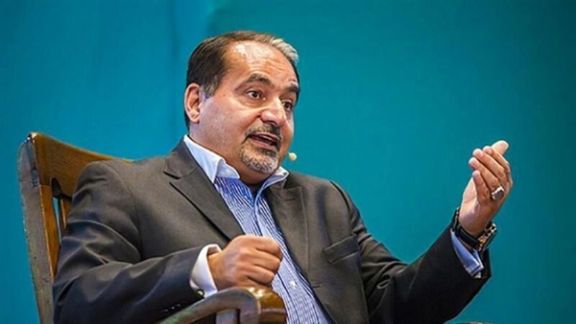
A US-based group has called on the government and donors to suspend financial support for Princeton University due to its inaction against a controversial Iranian scholar it employs.
In a letter published on Thursday, the nonprofit advocacy group United Against Nuclear Iran (UANI) conveyed its deep concern to the president and board of trustees of Princeton regarding the university’s continued employment of Hossein Mousavian.
UANI described him as “an agent of the Iranian regime” who is currently employed as a Middle East and nuclear policy specialist at the university.
In a documentary to mark Qasem Soleimani’s second death anniversary aired by Iranian state TV earlier this month, Mousavian bragged about how Iran’s threat to avenge his killing frightened the wife of Brian Hook, Washington’s special envoy for Iran at the time.
UANI called on Princeton donors to terminate their support, and for all US government grants and contracts with the university to be suspended until it fires Mousavian.
Princeton’s continued employment of Mousavian “makes it impossible for the university to be a safe, welcome, and credible institution of learning for both its students and other employees”, UANI’s Mark D. Wallace said, adding that “no responsible person should support Princeton” while Mousavian remains on its payroll.
Mousavian, who traveled to Iran to attend Soleimani’s funeral service, was Tehran’s ambassador to Germany when four Iranian dissidents were assassinated at a Berlin restaurant in 1992.
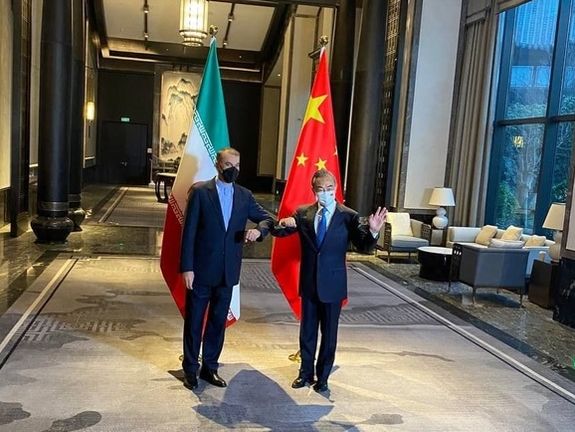
Iranian Foreign Minister Hossein Amir-Abdollahian and Chinese Foreign Minister Wang Yi have announced the launch of a 25-year cooperation deal signed in March.
Amir-Abdollahian said after a meeting with Wang, who is also a state councilor, that the two sides had agreed previously to announce January 14 as the official commencement of the agreement's implementation.
In a tweet in Chinese Friday, Amir-Abdollahian said during his visit he had exchanged views with Wang on a wide range of issues including the cooperation pact and the Vienna talks to restore the 2015 nuclear deal between Iran and world powers known as the Joint Comprehensive Plan of Action (JCPOA). "We reached important consensus on these matters], the Iranian foreign minister tweeted.
A summary of the meeting between Amir-Abdollahian and Wang was posted on China's foreign ministry Saturday according to which Wang reaffirmed China's opposition to US sanctions against Iran and blamed the United States’ unilateral withdrawal from the JCPOA as the reason for current difficulties with Iran. China and Iran are both subjected to US sanctions.
This week, the Biden Administration also tried to blame lack of progress in the nuclear talks on former President Donald Trump’s decision to withdraw from the Obama-era nuclear agreement.
Wang also said China firmly opposes political manipulation through topics including human rights, and interference in the internal affairs of Iran and other regional countries in an apparent reference to the US and its European allies' demand to include such topics in the Vienna nuclear talks.
A 25-year cooperation pact between Iran and China, according to Iran's Tejarat News, was first proposed by Iran's Supreme Leader Ali Khamenei during Chinese President Xi Jinping during his 2016 visit to Tehran. The agreement was signed on March 27during Wang's visit to Tehran.
The pact has been very controversial in Iranbecause its details have never been disclosed. A leaked copy of the final text only outlines the general terms of the agreement, but Tehran officials, beleaguered by economic crisis they cannot solve, hope it will bring billions in investment and make Iran part of China' Belt and Road Initiative, a multi-trillion-dollar infrastructure scheme intended to stretch from East Asia to Europe. The project aims to significantly expand China's economic and political influence and has raised concerns in the United States and elsewhere.
"The 25-year agreement with China will have an important role in strengthening the country's infrastructures. It will transform aerial navigation, petrochemical and oil infrastructure, urban and road transportation, as well as IT and communications," Ali Nikzad, deputy speaker of the Iranian parliament told the official news agency IRNA Saturday.
The Chinese foreign ministry's summary of the meeting between Amir-Abdollahian and Wang on Friday said the agreement would deepen Sino-Iranian cooperation in areas including energy, infrastructure, agriculture, health care and culture, as well as cyber security and cooperation with other countries.
Critics of the pact in Iran believe closer relations between Tehran and Beijing will provide a better foothold for China in the Middle East that Beijing depends on for its energy needs, as well as economic benefits without significantly contributing to the Iranian economy.
The flagship hardline newspaper Kayhan accused the critics of the Raisi administration's pursuit of closer relations with Eastern countries, namely China and Russia, of opposing the Chinese pact to mislead the public and sabotage Tehran's relations with Beijing and Moscow in order to secure the interests of the West.
"They are worried about the possible economic breakthroughs through Iran's strategic relations with Eastern countries which will neutralize the impact of US sanctions," an article in Kayhan said Saturday.